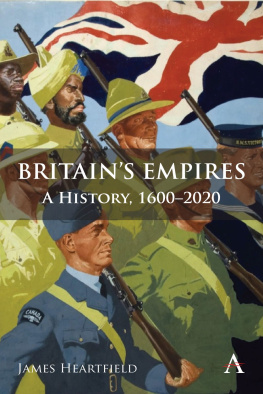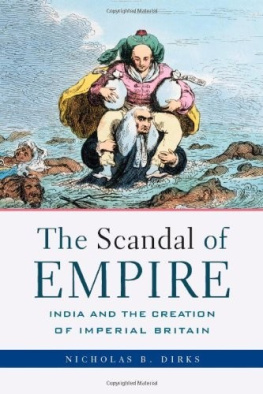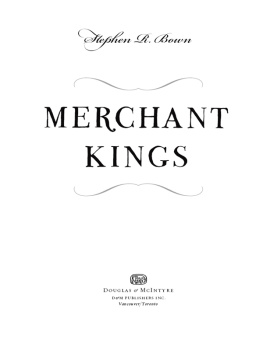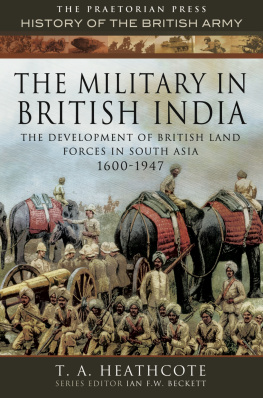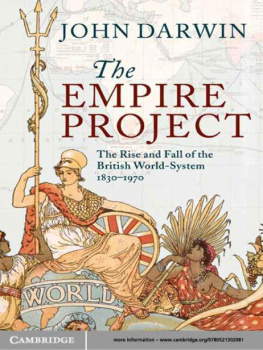Jonathan Eacott - Selling Empire: India in the Making of Britain and America, 1600-1830
Here you can read online Jonathan Eacott - Selling Empire: India in the Making of Britain and America, 1600-1830 full text of the book (entire story) in english for free. Download pdf and epub, get meaning, cover and reviews about this ebook. year: 2016, publisher: Omohundro Institute and University of North Carolina Press, genre: Politics. Description of the work, (preface) as well as reviews are available. Best literature library LitArk.com created for fans of good reading and offers a wide selection of genres:
Romance novel
Science fiction
Adventure
Detective
Science
History
Home and family
Prose
Art
Politics
Computer
Non-fiction
Religion
Business
Children
Humor
Choose a favorite category and find really read worthwhile books. Enjoy immersion in the world of imagination, feel the emotions of the characters or learn something new for yourself, make an fascinating discovery.

- Book:Selling Empire: India in the Making of Britain and America, 1600-1830
- Author:
- Publisher:Omohundro Institute and University of North Carolina Press
- Genre:
- Year:2016
- Rating:4 / 5
- Favourites:Add to favourites
- Your mark:
- 80
- 1
- 2
- 3
- 4
- 5
Selling Empire: India in the Making of Britain and America, 1600-1830: summary, description and annotation
We offer to read an annotation, description, summary or preface (depends on what the author of the book "Selling Empire: India in the Making of Britain and America, 1600-1830" wrote himself). If you haven't found the necessary information about the book — write in the comments, we will try to find it.
Jonathan Eacott: author's other books
Who wrote Selling Empire: India in the Making of Britain and America, 1600-1830? Find out the surname, the name of the author of the book and a list of all author's works by series.
Selling Empire: India in the Making of Britain and America, 1600-1830 — read online for free the complete book (whole text) full work
Below is the text of the book, divided by pages. System saving the place of the last page read, allows you to conveniently read the book "Selling Empire: India in the Making of Britain and America, 1600-1830" online for free, without having to search again every time where you left off. Put a bookmark, and you can go to the page where you finished reading at any time.
Font size:
Interval:
Bookmark:
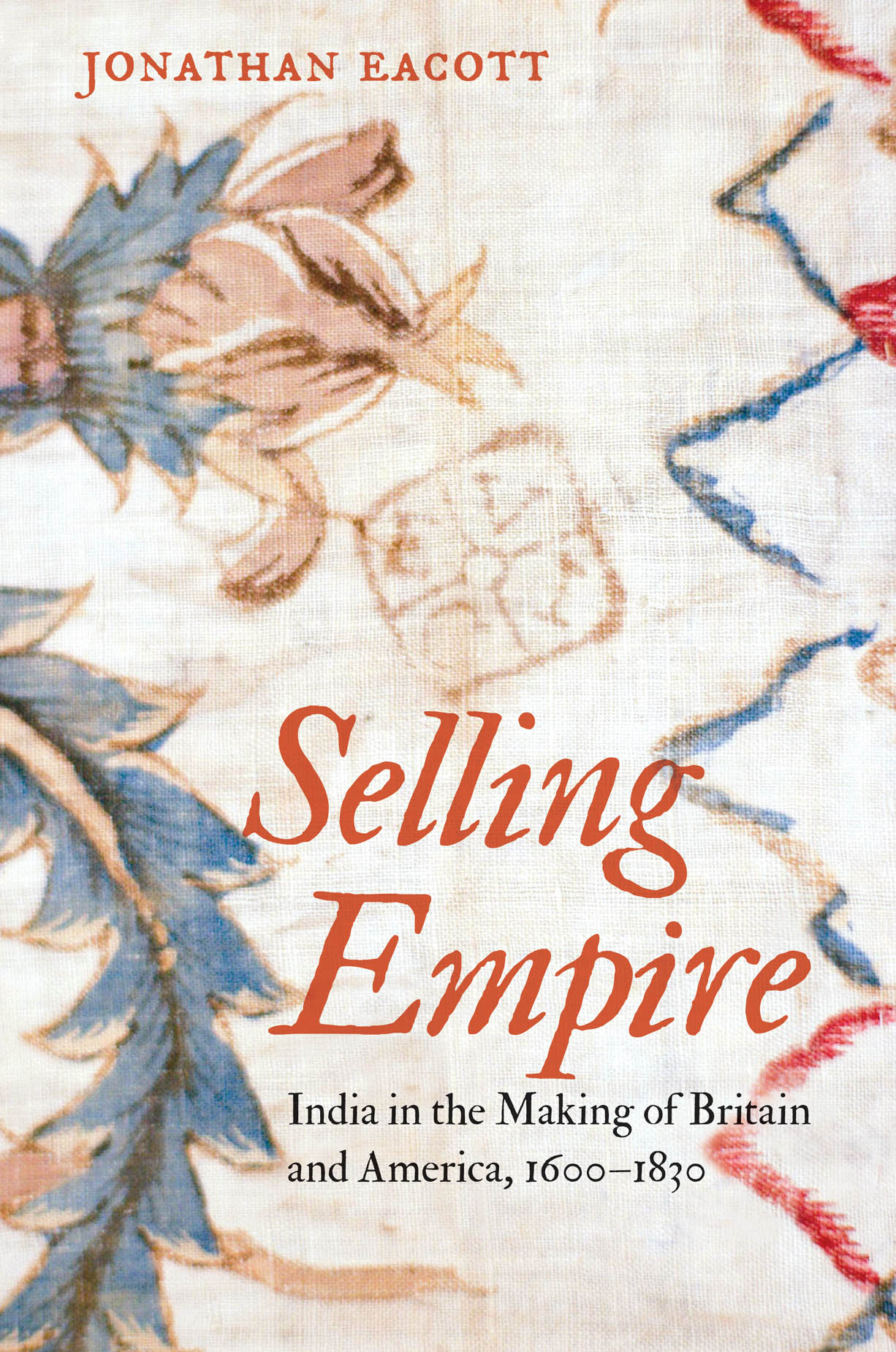
Selling Empire
The Omohundro Institute of Early American History and Culture is sponsored by the College of William and Mary. On November 15, 1996, the Institute adopted the present name in honor of a bequest from Malvern H. Omohundro, Jr.
2016 The University of North Carolina Press
All rights reserved
Manufactured in the United States of America
Jacket illustration: Detail of stamp for United East India Company on back of Tree of Life Textile Panel, India, 17401760, India chintz, accession # 1954-494 (Photo by Jonathan Eacott with the permission of The Colonial Williamsburg Foundation)
Library of Congress Cataloging-in-Publication Data
Eacott, Jonathan, author.
Selling empire : India in the making of Britain and America, 16001830 / Jonathan Eacott.
pages cm
Includes bibliographical references and index.
ISBN 978-1-4696-2230-9 (cloth : alk. paper)
ISBN 978-1-4696-2231-6 (ebook)
1. ImperialismEconomic aspects. 2. Great BritainColoniesIndia.
3. Great BritainColoniesAmerica. 4. Great BritainColoniesHistory.
I. Omohundro Institute of Early American History & Culture, sponsoring body. II. Title.
DA16.E23 2016
382.609540903dc23
2015035748
The paper in this book meets the guidelines for permanence and durability of the Committee on Production Guidelines for Book Longevity of the Council on Library Resources. The University of North Carolina Press has been a member of the Green Press Initiative since 2003.
cloth 20 19 18 17 16 5 4 3 2 1
I am not sure anymore when, exactly, I began thinking about the issues raised and addressed by this book, but I am sure that I am only finishing it thanks to more people than I can name. I would not have been in a position to even imagine writing this book without Brian Lewis at McGill University, and Sandra den Otter, at Queens University, Kingston, who transformed how I thought about history and encouraged me, with suitable caution, to pursue a Ph.D. This book would not have been possible without David Hancocks interest in my curious proposal to bring India to the study of the Atlantic world, his willingness to work with me for that Ph.D. at the University of Michigan, and his unparalleled advice and guidance many years later. I simply cannot imagine a better dissertation adviser and mentor. The University of Michigan itself, where much of the research and many of the ideas for this book developed, was also a model of academic support. Dena Goodman, Kali Israel, David Porter, as well as Allison Abra, Maya Jasanoff, Jeff Kaja, and Amanda Moniz, provided incisive commentary on much of my early research and writing. I also had the great fortune while a Michigan student to spend a year affiliated with the University of Londons Institute for Historical Research. My IHR adviser, dissertation committee member, and indefatigable reader Peter Marshall brought his encyclopedic knowledge and judicious comments to bear on my often inexcusably rough chapters, patiently reading multiple drafts from the dissertation through the manuscript to save me from countless mistakes. With his warm hospitality and irrepressibly good humor, he makes every stay in England brighter. I cannot thank them all enough.
This book took on its present shape through two productive years as a postdoctoral fellow at the Omohundro Institute of Early American History and Culture in Williamsburg, Virginia. For me, as for many others, the Omohundro Institute provided invaluable time, support, and guidance to fundamentally reimagine the possibilities and expansion of my dissertation research. I thank everyone at the Institute, in particular, Ron Hoffman, for his extraordinary generosity and support, and my editors Fredrika Teute, Nadine Zimmerli, and Virginia Chew, who have worked through my inordinate number of changes with saintly patience but, most of all, with great insightoften seeing much more clearly than I did the best path forward. At Colonial Williamsburg, Linda Baumgarten thoughtfully guided me through the fabric collections. I was also lucky that my time in Williamsburg overlapped with Mark Hanna, Dan Livesay, and Molly Warsh and that while there I also got to know Amanda Herbert and Nick Popper, all of whom through conversation, careful reading, shared sources, and warm friendship put their imprints throughout this book.
The long process of researching and writing would have been impossible without funding and intellectual support from a number of institutions on three continents. In America, I am indebted for residential fellowship support from the Program in Early American Economy and Society and the Library Company of Philadelphia; the Winterthur Museum, Delaware; and the Peabody Essex Museum, Salem, Massachusetts. My research in Britain was enabled by a Mellon Humanities Fellowship at the IHR in London, a dissertation fellowship from the North American Conference on British Studies, the Omohundro Institute, and grants from the American Historical Association, the University of Michigan, and the University of California, Riverside. This support allowed me to spend many happy and productive months benefiting from the patient advice of librarians and archivists throughout Britain, including at the British National Archives, British Library, National Library of Scotland, National Archives of Scotland, Glasgow City Archives, Gloucestershire Archives, Bedfordshire and Luton Archives, John Rylands Library, Guildhall Library, Keele University Special Collections, Christies Auction House Archives, Bodleian Library, and Cambridge University Library. For taking my requests, humoring my ideas, imparting their knowledge, and even inviting me for dinner or drinks, I am grateful to them all. In India, my thanks to the Deputy Director of the State Archives of West Bengal as well as to the staff at the Ahmedabad Calico Museum, Asiatic Society of Kolkata, and National Library for helping me within the tight confines of my schedule and despite the ambiguity of many of my requests. My research in India was facilitated by funding from the History Department at the University of Michigan.
My deep appreciation extends to a great many people who read various versions of this book at various times in various states of incompleteness. The book as a whole benefited immeasurably from the input of James Allegro, Zara Anishanslin, John Brewer, Cary Carson, Alison Games, Paul Mapp, Cathy Matson, Jane Merritt, Tillman Nechtman, David Ormrod, Brett Rushforth, Robert Travers, and Karin Wulf. Audiences and seminar participants at Oxford and Georgetown heard or read versions of Chapter 2, on which they kindly and helpfully commented. An earlier version of Chapter 2 also benefited immensely from Chris Grasso and Meg Mussel-white at the William and Mary Quarterly, where it appeared in October 2012. Chapter 4 benefited from input from John Brooke and the Ohio State University Seminar in Early American History and Culture and from the charitable readings of Rob Parkinson and Alexander Haskell, who helped focus my disparate (and often desperate) thoughts. Chapter 5 was improved in countless ways by Carole Shammas, Peter Mancall, and the USC-EMSI American Origins Seminar at the Huntington Library. An early version of some of the material in Chapter 6 benefited from the guidance of Maxine Berg and the editors of Quaderni Storici, in which it appeared in December 2006. Many other parts of the book benefited from audiences and conversations with colleagues at universities and conferences throughout North America and Europe. Several anonymous reviewers generously gave their time and thoughtful comments, without which this book would have been much poorer.
Font size:
Interval:
Bookmark:
Similar books «Selling Empire: India in the Making of Britain and America, 1600-1830»
Look at similar books to Selling Empire: India in the Making of Britain and America, 1600-1830. We have selected literature similar in name and meaning in the hope of providing readers with more options to find new, interesting, not yet read works.
Discussion, reviews of the book Selling Empire: India in the Making of Britain and America, 1600-1830 and just readers' own opinions. Leave your comments, write what you think about the work, its meaning or the main characters. Specify what exactly you liked and what you didn't like, and why you think so.

